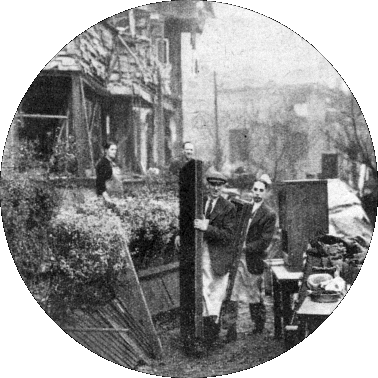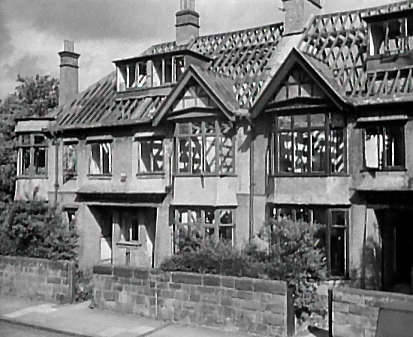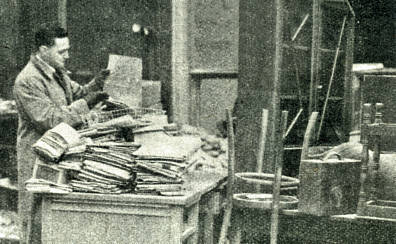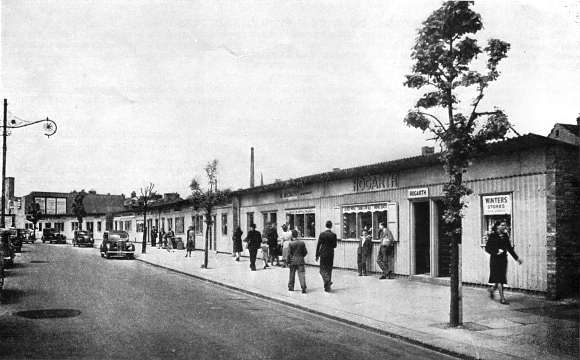|
Index...
|
 ne small mercy that people were extremely grateful for at that time, was the official suspending of rationing in Coventry for 17 days. It was the only sensible option at the time because many ration books had been destroyed, but at least the people had one less burden until it ended on the 2nd December.
ne small mercy that people were extremely grateful for at that time, was the official suspending of rationing in Coventry for 17 days. It was the only sensible option at the time because many ration books had been destroyed, but at least the people had one less burden until it ended on the 2nd December.

Unfortunately, this event also brought out the greedier side of human nature - some people from surrounding areas took advantage of the "free for all" by travelling to Coventry to purchase the extra unrationed food, and this deeply angered the locals. This wasn't the only unpleasant side of folk to be noticed either - there were many reports of looting, and although some of it was down to desperate people "rescuing" usable items from abandoned homes, some was quite simply thieving, including many cases of valuables being stolen and coin meters being broken open. But on the whole it was a time of deep respect, camaraderie and gallantry.
Despite all the hardships - a state of devastation and poverty completely unimaginable by current generations - rebuilding did gradually take place. In fact, once work got underway, the speed that the workers moved at was quite astonishing. Within the first few weeks, basic repairs had been carried out on 12,000 homes, and was being continued at an amazing rate averaging 532 houses per day. This was largely due to hundreds of builders being brought into the area, including many with tiling experience being allowed leave from the armed forces to help with the rebuilding.
To quickly increase the number of inhabitable homes, many that were deemed beyond repair were stripped of all the useful materials, such a roof tiles, doors, windows and frames - and the parts reused in houses that required relatively minor repairs.
 Terraced houses, typical of so many in Coventry, receiving treatment.
Terraced houses, typical of so many in Coventry, receiving treatment.
The sound of men at work was also a morale raiser, and soon this, along with the gradual restoration of water, gas and electricity supplies, returned the people of Coventry to a feeling of normality, and once again a sense of pride and purpose began to return.
Surprisingly, within the first two weeks after the raid, many of the bombed factories had already restarted production, some almost at full capacity again, and this, of course, was going to be the priority if we were to win the war. More emphasis was put on the 'shadow' factories on the outskirts of the city to minimise the detrimental affect on production of any future raids.
Even before production was resumed, newspapers, like the Daily Herald, exclaimed defiantly how Coventry was not finished, with headlines such as "NOT A MORTAL BLOW - WORK WILL RESTART". Such sensationalism was frowned upon by the authorities, who were anxious not to taunt the Germans into a follow-up attack on the city.
 Sorting out paperwork in the office ready to resume war production.
Sorting out paperwork in the office ready to resume war production.
As for the large scale redevelopment - well, for now Coventry would have to make do with being "patched up" - the ambitious stuff would have to wait until the enemy was beaten. But rebuild we certainly would, and a young architect named Donald Gibson and his team already had designs on our city centre.
Meanwhile, everyone was doing their best to forge some kind of normality out of the aftermath of the horror. Richard T. Howard, the Provost of Coventry Cathedral, was not slow to react, and he knew that providing services would be of comfort to his regular flock, so initially he held small meetings in the drawing room of his own house. By the second Sunday after the 14th, the Wyley Chapel in the crypt had become the venue, although this required some sealing of the cathedral floor above, to put an end to the congregation suffering rain dripping through the ceiling.

As the image above shows, shopkeepers wasted no time in moving into temporary accomodation, so that trading could resume. Some of these buildings would turn out to be not so temporary, and were still in use many decades after the war. Likewise, factory workers quickly set about the urgent task of clearing the debris from their offices and machine-shops, salvaged what they could, and diligently began doing their bit to provide our armed forces with the tools needed to fight back against the aggressors. Many of these unsung heroes had to work through the winter months in cold, windy factories, which lacked windows and roofs!
Website by Rob Orland © 2002 to 2026